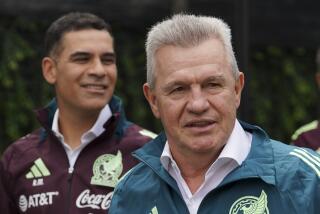CONCACAF chief says teams will be better in 2026; Japan earns clean reputation
Reporting from NIZHNY NOVGOROD, Russia — The head of North American soccer believes the region’s teams will be greatly improved by 2026, when the World Cup returns to the continent for the first time in 32 years.
Mexico’s traditional round of 16 loss this week left the Confederation of North, Central American and Caribbean Football (CONCACAF) without a team in the quarterfinals for the third time in the last four World Cup tournaments.
“I think you will see an improvement in four years,” CONCACAF President Victor Montagliani said Tuesday, though suggesting “eight years is more realistic.”
Elected to lead CONCACAF in 2016, the Canadian official acknowledged the soccer body had too often let down its 35 FIFA member nations.
“Quite frankly, over the last 40 years CONCACAF as a confederation has not really done much to help the federations try to compete at a world level,” Montagliani said of an era tainted by corruption, and leaders indicted by the U.S. Department of Justice.
Now moved from Manhattan to Miami, CONCACAF has reformed its business practices and revamped competitions for national and club teams.
A Nations League kicks off next year, designed to raise competitive standards by giving smaller national teams more fixtures and revenue in a two-year cycle. And four places were added to the marquee Gold Cup, which the United States will host next year with 16 teams.
“Then we will see what we look like eight years from now when we host a World Cup in our backyard,” Montagliani said.
Clean loss
Japan’s loss to Belgium on Monday on a last-second goal deep in stoppage time marked the first time since 1970 that a team has blown a 2-0 lead in a World Cup elimination game.
And although the result was devastating, it wasn’t enough to shake the fans and players from their traditional postgame chores of cleaning up the stadium.
After the heartbreaking defeat, Japan’s fans, many with tears in their eyes, were seen pulling out huge plastic bags and collecting the trash in their section at Rostov Arena. The Japanese have done that after every game its team has played in Russia. Senegal’s fans did the same.
What couldn’t be seen, however, was the team’s dressing room. After thanking their supporters as they left the field, the players cleaned up their bench, cleaned up their locker room and left a thank-you note in Russian for the stadium workers.
“What an example for all teams!! Privilege to work with!” FIFA general coordinator Priscilla Janssens wrote on Twitter, including a photo of a spotless locker room. Take a look @priscillaboca
In another classy move, Japanese coach Akira Nishino, who wasn’t hired until April and who coached his first competitive game in his team’s World Cup opener, blamed not the players or the referees (looking at you, Juan Carlos Osorio) but himself.
“I don’t think the players were to blame. I think it was me who might have lost control of the game,” said Nishino, who pushed for a goal on the corner kick in stoppage time that led to Belgium’s counterattack winner.
TV ratings down 42% in U.S.
The lack of a U.S. team has led to a big viewership drop for World Cup telecasts.
The 48 group-stage telecasts on Fox and FS1 averaged 2,069,000 viewers, according to Nielsen Media Research. That’s down 42% from the 3.54 million average on ESPN, ESPN2 and ABC four years ago.
Excluding games involving the U.S. team in previous World Cup tournaments, the average declined 28% from the 2014 tournament in Brazil and was up 1% from the 2010 tournament in South Africa.
Also hurting the ratings is the fact most group-stage kickoff times this year were in the early morning. Games in 2014 started mostly between 9 a.m. and 1 p.m. Pacific time.
The Associated Press contributed to this report.
[email protected] | Twitter: @kbaxter11







